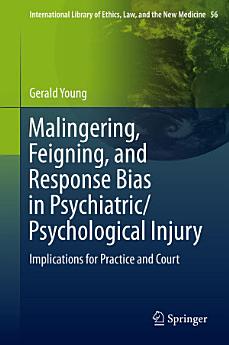Malingering, Feigning, and Response Bias in Psychiatric/ Psychological Injury: Implications for Practice and Court
About this ebook
In Malingering, Feigning, and Response Style Assessment in Psychiatric/Psychological Injury, Dr. Young ambitiously sets out to articulate and synthesize the polarities involved in the assessment of response styles in psychological disabilities, including PTSD, pain, and TBI. He does so thoroughly and very even-handedly, neither minimizing the degree that outright faking can be found in substantial numbers of examinees, nor disregarding the possibility that there can be causes for validity test failure other than malingering. He reviews the prior systems for classifying evidence of malingering, and proposes his own criteria for feigned PTSD. These are conservative and well-grounded in the prior literature. Finally, the book contains dozens of very recent references, giving testament to Dr. Young's immersion in the personal injury literature, as might be expected from his experience as founder and Editor in Chief for Psychological Injury and the Law.
Reviewer:
Steve Rubenzer, Ph.D., ABPP
Board Certified Forensic Psychologist
About the author
Gerald Young, Ph.D., is an Associate Professor at Glendon College, York University. He is Editor-in-Chief of Psychological Injury and Law and President of the Association for Scientific Advancement in Psychological Injury and Law. He has published other works in the area (e.g., Causality of Psychological Injury: Presenting Evidence in Court, 2007). His other area of research is in child development (Development and Causality: Neo-Piagetian Perspectives, 2011), which was referred to in a review as his “magnum opus” and as “remarkable.” His most recent trade book is called You Can Rejoin Joy: Blogging for Today’s Psychology (2013; rejoiningjoy.com). He may be reached at [email protected].






